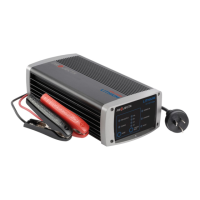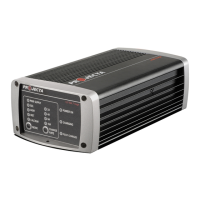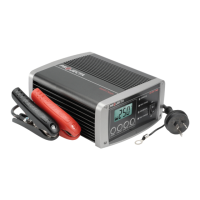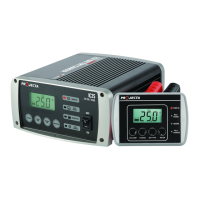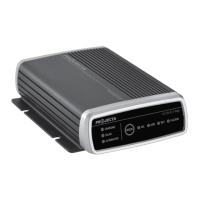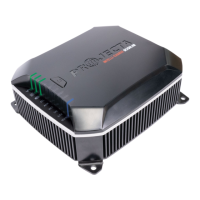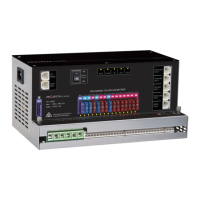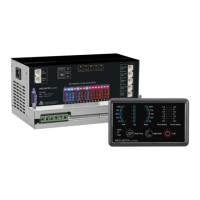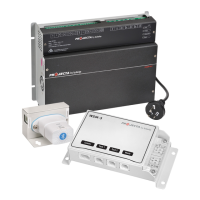Do you have a question about the Projecta IC1000 and is the answer not in the manual?
Crucial safety precautions for battery charging, including ventilation, indoor use, correct battery types, and handling damaged cords.
Explains the 7-stage charging process: Desulphation, Soft Start, Bulk, Absorption, Analysis, Recondition, and Float stages.
Details the ability to adjust charge rate and support for multiple battery chemistries (GEL, AGM, WET, Calcium).
Covers Power Supply mode, wiring harness for IC700, and rubber end caps for IC700W.
Describes how LEDs indicate charging status and stages like Desulphation, Soft Start, Bulk, Absorption, Analysis, Recondition, and Float.
Details Polarity Protection and Over Temperature Protection features to ensure safe operation.
Explains Switchmode Technology for lightweight design and the thermostatically controlled Cooling Fan.
Information about the optional remote control display for monitoring and controlling the charger.
Details specifications for IC700, IC700W, IC1000, IC1500 including input/output voltage, current, and power.
Outlines supported battery ranges (Deep Cycle, Automotive, Marine) and types (GEL, AGM, WET, Calcium).
Provides physical size (mm) and weight (Kg) for each charger model.
Instructions for checking and topping up electrolyte levels in non-sealed batteries before charging.
Step-by-step guide for connecting the charger to the battery, both out of and in the vehicle (negatively/positively earthed).
Procedure for connecting the charger to the vehicle battery using the optional harness for IC700 models.
Steps for connecting the charger to the 240V mains supply and setting the appropriate charge rate.
Guide on selecting battery chemistry type and understanding the charging process and LED indicators.
Instructions on how to safely disconnect the charger from the mains power and the battery.
Specific instruction to check electrolyte level when using Calcium mode.
Guidance on mounting the charger indoors in a well-ventilated space, ensuring adequate clearance.
Instructions for hard-wiring the charger's DC leads to the battery, including fuse requirements.
Explains how to select the correct charging profile for GEL, AGM, WET, and Calcium batteries.
Details using the charger in Power Supply mode for appliances or maintaining vehicle settings, providing 13.8VDC.
Describes charging parameters for GEL (14.1V), AGM (14.4V), and WET (14.7V/16V) batteries.
Explains Calcium mode benefits, equalization charge up to 16V, and its suitability for deeply discharged batteries.
Instructions on how to lock and unlock the charger's settings to prevent accidental changes.
Lists common fault codes (Red LED flashes) and their corresponding remedies for short circuits, timing out, and recondition issues.
Answers questions on identifying a charged battery, the charging LED not coming on, and low voltage charging.
Addresses using the charger as a power supply, appliance loads, and charger resets.
Explains how to interpret LED indicators to determine the current stage of the battery charging process.
Guidance on how to bypass Desulphation or Soft Start stages and use Power Supply mode to advance charging.
Discusses how connected appliances affect charging accuracy and recommends Power Supply mode for such scenarios.
Details why Calcium mode takes longer, the need for equalization, and the benefits of Calcium batteries.
Outlines the 1-year warranty for products sold in Australia, exclusions, and the process for making a claim.
States that goods come with non-excludable guarantees under the Australian Consumer Law.
| Output Current | 10A |
|---|---|
| Maximum Battery Size | 200Ah |
| Input Voltage | 240V |
| Input Frequency | 50Hz |
| Output Voltage | 12V |
| Battery Type | AGM, Gel |

